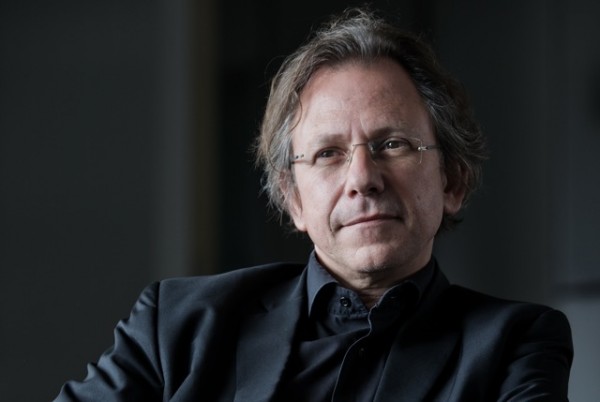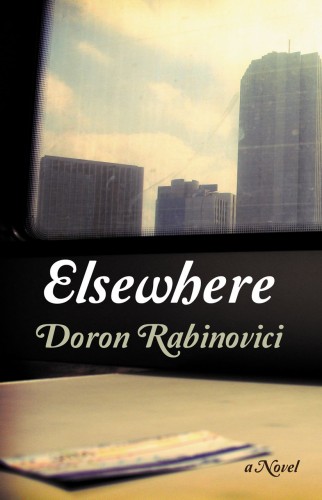Book Review: The Absurdity of Living in the Space Between — “Elsewhere” by Doron Rabinovici
Elsewhere is a tragicomic work, its plethora of absurd coincidences an attempt to portray the senseless plight of the post-postmodern man, alienated and rootless, as he moves from non-place to non-place.
Elsewhere by Doron Rabinovici. Translated from the German by Tess Lewis. Haus Publishing, 246 pages, $22.95.
by Christiane K. Alsop
Elsewhere, Doron Rabinovici’s ambitious but problematic novel, begins on a plane – in other words, in limbo, in the space between, neither here nor there. Its protagonist, Ethan Rosen, sociology professor by profession, op-ed writer and polemicist by passion, is at home neither in Israel nor in Vienna, is fluent in many languages but compulsively opposed to consensus. Exhausted from a short four-day trip to Israel, he finds himself in the wrong seat on his flight back to Vienna: the Orthodox Jew to his left is rocking his head in prayer as though he were “a member of a hard rock band.” Rosen escapes to an empty seat where he finds a copy of the Vienna newspaper containing the obituary of his mentor and friend, Dov Zadek. This obituary enrages him; it misrepresents Dov. When the Viennese woman next to him asks his name, Ethan replies “Johann Rossauer” and then pretends to be firmly attached to this fictional figure’s beloved Austrian Heimat.
Almost all the key figures and questions of the novel are here on the plane with Ethan. The woman seated next to him will become his girlfriend, and later Ethan will move back to Israel with her. The author of the offending obituary turns out to be his rival for a professorship in Vienna and – perhaps – his own half-brother. The Orthodox Jew is the disciple of a Rabbi who believes that the Messiah has been conceived but was murdered in the Holocaust and now must be recreated in a test tube; moreover, Ethan’s ailing father is a relative of this murdered Messiah. Would Ethan be willing to donate his sperm for the project? Yes, he will, if in return the Rabbi will help determine whose kidney donation will serve his father better – Ethan’s or his unexpected half-brother’s.
Elsewhere is a tragicomic work, its plethora of absurd coincidences an attempt to dramatize the senseless plight of the post-postmodern man, alienated and rootless, as he moves from non-place to non-place. He has neither country, nor nation. Heimat – the German ideal of a home country – is a fiction. Exile is ubiquitous; life takes place in the space in-between.
The novel also strives to dramatize the burden of the second generation of Holocaust victims. Rosen is on a mission to escape his parents’ overdose of love. “Their affection was ruthless,” he insists. He flees their embrace by embracing ambiguity, a vagueness that he applies to all his relationships because it protects him from experiencing the pain of those who are willing to stay and endure. He is beset with an overwhelming angst – not the concrete angst of facing genocidal extinction, but a diffuse angst that expresses itself in paralyzing “mistrust for civilizations and ideologies.” He is the skeptical intellectual incarnate. Aloof and distant, mocking and comical, he tries to rise above existence by observing it from all angles. That is his strength and his weakness. His determined remoteness denies Rosen the secure sense of definition he yearns for, a definition that could ground him in his family, his work, his home.
Nonetheless, Rosen’s cool powers of observation illuminate the inanities of modern life. The chaotic inner city and the stilted world of academics are masterfully drawn, as is his portrait of Israeli society: multi-ethnic, struggling with victimhood as well as perpetration, filled with extremists and moderates weaving distinctive variations in their quest for identity. Victims contribute to their victimhood, perpetuators to their evil doing, but the author resists the temptation of reducing human relations to those two categories.
At the end of the novel, the aloof Rosen is finally moved. He cries. But his tears flow too late to be convincing. The problem is that it is difficult to bond with an anti-hero who puts himself into the space between. Rosen’s ambivalences become infectious; the reader finds it too easy to step back from the novel’s conflicts and ideas. You are not willing to accept the narrative’s speedy somersaults into the grotesque: Ethan’s search for identity, his rivals’ search for his father, and the Rabbi’s search for the Messiah. The female characters – Rosen’s mother and his girlfriend – serve primarily as sidekicks to the males, who are given the opportunity to articulate the book’s glittering contradictions and amusing paradoxes. Transitions from place to place and from moment to moment stutter along, while the wild satire, which initially generates laughter, becomes exhausting.

Author Doron Rabinovici — “Elsewhere” is nothing if not ambitious. Photo: Reinhard Werner.
I read Elsewhere first in German, and then in Tess Lewis’s English translation. Her work irons out some of the shortcomings of the author’s craft. German critics received Elsewhere enthusiastically. I found only one review critical of Rabinovici’s hasty, journalistic style and contrived plotting.
Rabinovici has published two previous novels (one of which has been published in English) and a collection of short stories. He has also written essays for anthologies and his dissertation on the Vienna Judenrat, the Jewish Council, was published in Austria and Germany to rave reviews. In the U.S., however, the Holocaust historian Christopher Browning faulted him for his arguments taking on “an increasingly exculpatory tone on the one hand or … [being] … simply bizarre and contradictory on the other hand.”
In the work of Rabinovici’s contemporaries, such as Marlene Streeruwitz or Herta Müller, the human struggle for purpose and meaning emerges subtly, from between the lines. Elsewhere depends far too much on rampant absurdity. Less would have made the book much more powerful.
Christiane K. Alsop, is a writer and an adjunct professor at Lesley University’s Graduate Program for Intercultural Relations. Her writing explores the trauma of history for the post-Nazi generation of Germans. Her personal essay, Presumed Guilty, was selected as a Notable Essay in the Best American Essays 2006. Among her academic interests are auto-ethnography, biographical story telling, and the significance of objects in human relationships.
Tagged: Christiane K. Alsop, Doron Rabinovici, Elsewhere, German literature, Haus Publishing

